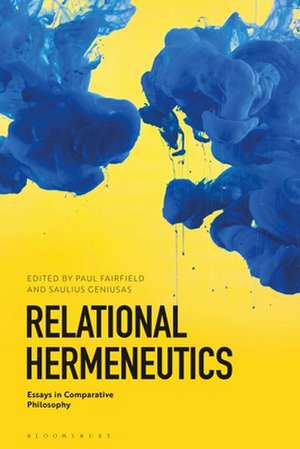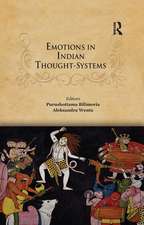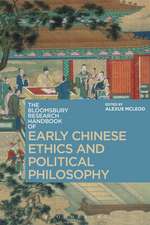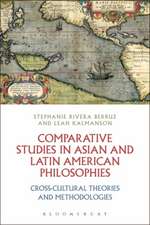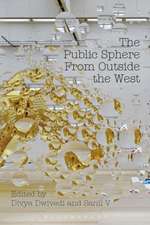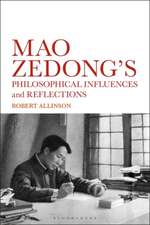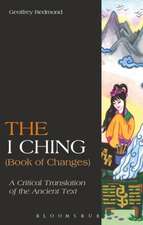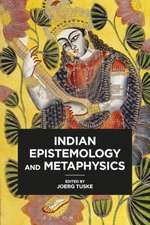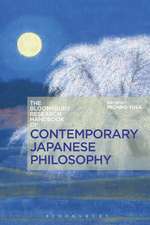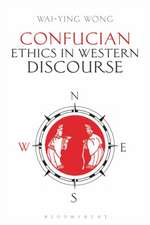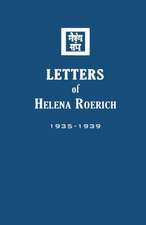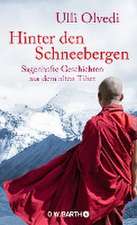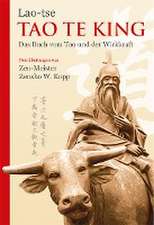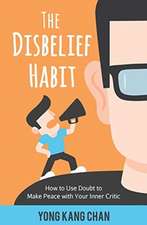Relational Hermeneutics: Essays in Comparative Philosophy
Editat de Professor Paul Fairfield, Saulius Geniusasen Limba Engleză Paperback – 29 apr 2020
| Toate formatele și edițiile | Preț | Express |
|---|---|---|
| Paperback (1) | 224.94 lei 43-57 zile | |
| Bloomsbury Publishing – 29 apr 2020 | 224.94 lei 43-57 zile | |
| Hardback (1) | 715.66 lei 43-57 zile | |
| Bloomsbury Publishing – 3 oct 2018 | 715.66 lei 43-57 zile |
Preț: 224.94 lei
Preț vechi: 288.97 lei
-22% Nou
Puncte Express: 337
Preț estimativ în valută:
43.04€ • 45.05$ • 35.82£
43.04€ • 45.05$ • 35.82£
Carte tipărită la comandă
Livrare economică 31 martie-14 aprilie
Preluare comenzi: 021 569.72.76
Specificații
ISBN-13: 9781350161696
ISBN-10: 1350161691
Pagini: 272
Dimensiuni: 156 x 234 x 18 mm
Greutate: 0.38 kg
Editura: Bloomsbury Publishing
Colecția Bloomsbury Academic
Locul publicării:London, United Kingdom
ISBN-10: 1350161691
Pagini: 272
Dimensiuni: 156 x 234 x 18 mm
Greutate: 0.38 kg
Editura: Bloomsbury Publishing
Colecția Bloomsbury Academic
Locul publicării:London, United Kingdom
Caracteristici
Chapters by renowned scholars in their respective fields: for example Babich on existentialism, Busch on Sartre, Calcagno on de Beauvoir, Fairfield on hermeneutics, and Colapietro on pragmatism
Notă biografică
Paul Fairfield is Professor of Philosophy at Queen's University in Kingston, ON, Canada. He is the author of nine sole-authored books and editor or co-editor of five anthologies. His writings cover themes in philosophical hermeneutics, phenomenology, and pragmatism.Saulius Geniusas is Associate Professor of Philosophy at the Chinese University of Hong Kong. He is the author or editor of several books and anthologies, including The Origins of the Horizon in Husserl's Phenomenology (2012), Stretching the Limits of Productive Imagination (2018).
Cuprins
Editors' Introduction: Relational Hermeneutics Part 1: Hermeneutics and Philosophies of Existence 1. Babette Babich, "Solicitude: Heideggerian Care and Assistance"2. Thomas W. Busch, "Sartre: From Hyperbolic Existentialism to Crypto-Hermeneutics"3. Antonio Calcagno, "The Existentialist Reworking of Hermeneutics: Heidegger, Sartre, and de Beauvoir"4. Andrew Wiercinski, "The Hermeneutics of Lived Time" Part 2: Hermeneutics and Pragmatism 5. Paul Fairfield, "Hermeneutical Pragmatism"6. Vincent Colapietro, "The Pragmatic Spiral"7. Ramsey Eric Ramsey and Raelynn Gosse, "A Poet on Each Side of the Poem: A Hermeneutic and Democratic Demand for Engaging Tradition"8. Saulius Geniusas, "Things as they are / Are changed upon the blue guitar: Self-Realization and Productive Imagination" Part 3: Hermeneutics and Poststructuralism 9. Carlos Prado, "Foucault and Hermeneutics"10. Pol Vandevelde, "Dialogue or Drama? The Role of Language as Seen by Gadamer and Foucault"11. Marc-Antoine Vallee, "Understanding: A Violent Aim?"12. Lisa Watrous, "Hermeneutics as Loving Understanding: Toward a Feminist Poststructuralist Hermeneutics" Part 4: Hermeneutics and Eastern Thought 13. Nicholas Davey, "The Turning Word: Relational Hermeneutics and Aspects of Buddhist Thought"14. Eric S. Nelson, "Confucian Relational Hermeneutics, the Emotions, and Ethical Life"15. David Chai, "Daoist Existential Hermeneutics and the Art of World-Making"Index
Recenzii
To find "oneself as another" (Ricoeur) - surely a great motto for unfettered minds. By exploring the role of interpretive understanding in numerous fields, Relational Hermeneutics offers convincing proof of Gadamer's claim of the differential "universality" of hermeneutical inquiry. In a time ravaged by deception and fake news, the book strikes a blow for genuine understanding across borders, thus providing a sheet anchor against myopic positivism, ethnocentrism, and arid conceptualism. One can only wish the book a broad readership, in the West and the East.
To investigate what is involved in interpreting and understanding things- literary works, sacred scripture, cryptic memos, recipes, other people, anything at all-is the task of philosophical hermeneutics. The essays collected in this volume assume this task but redirect the inquiry in a novel manner. Each essay addresses one of four traditions-existentialism, pragmatism, poststructuralism or Eastern philosophy-and discusses particular themes as they have been treated by authors belonging to that tradition. The result of this 'relational hermeneutics' is far more than just another volume of comparative philosophy. It is an unexpected new insight into how we understand ourselves.
Bringing hermeneutic philosophy into conversation with other Western and Eastern philosophical traditions, the contributors to Relational Hermeneutics track illuminating affinities and differences between hermeneutic figures such as Heidegger, Gadamer and Ricouer and existentialist, pragmatist, post-structuralist, Buddhist, Daoist and Confucian figures such as Dewey, De Beauvoir, Foucault, Irigaray and Zhuangzi. In so doing the contributors provide new insights into issues of time, the body, experience, understanding, poetry, ethics, power, emotion and "the turning word." The result is a very welcome and important volume.
To investigate what is involved in interpreting and understanding things- literary works, sacred scripture, cryptic memos, recipes, other people, anything at all-is the task of philosophical hermeneutics. The essays collected in this volume assume this task but redirect the inquiry in a novel manner. Each essay addresses one of four traditions-existentialism, pragmatism, poststructuralism or Eastern philosophy-and discusses particular themes as they have been treated by authors belonging to that tradition. The result of this 'relational hermeneutics' is far more than just another volume of comparative philosophy. It is an unexpected new insight into how we understand ourselves.
Bringing hermeneutic philosophy into conversation with other Western and Eastern philosophical traditions, the contributors to Relational Hermeneutics track illuminating affinities and differences between hermeneutic figures such as Heidegger, Gadamer and Ricouer and existentialist, pragmatist, post-structuralist, Buddhist, Daoist and Confucian figures such as Dewey, De Beauvoir, Foucault, Irigaray and Zhuangzi. In so doing the contributors provide new insights into issues of time, the body, experience, understanding, poetry, ethics, power, emotion and "the turning word." The result is a very welcome and important volume.
